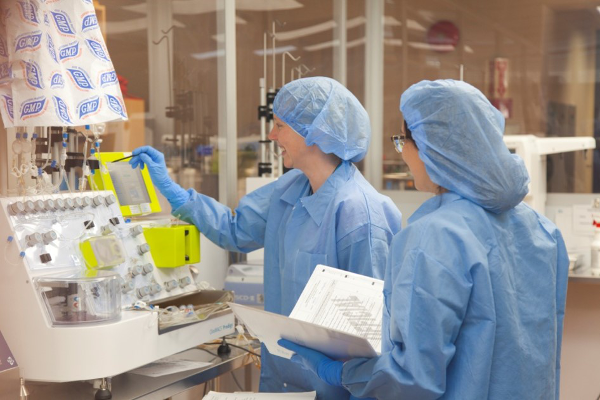By Heather Blumenthal

Conconi Family Manufacturing Facility (Victoria, BC)
There’s no question – immunotherapy works. Numerous research studies, many of them funded by BioCanRx, have shown that taking a cancer patient’s own T cells, “supercharging” them in the lab to recognize and fight the patient’s own tumour and using a virus to deliver them to the cancer site is a new and effective way of fighting the disease, offering hope where little existed previously. While many therapies are still at the research stage, some have been approved by regulatory bodies for use in patients.
Genetically engineering a patient’s own T cells in order to achieve this “supercharged” status requires – or has until now – specialized laboratory infrastructure and lots of human expertise. That creates two obvious problems – first, immunotherapy is hard to access, particularly if you don’t live near one of the centralized laboratories that carry out this labour-intensive and costly work requiring highly trained personnel. And second – and more important – immunotherapy is expensive. The result? One of the most promising avenues for treating advanced cancers is out of reach of many patients.
But not for long. Not if BioCanRx has its way. Taking seriously the notion that supporting research whose results are not applied to patient care is only doing half the job, it is supporting the development of local and affordable solutions to make immunotherapy a realistic option for people with cancer.
First, with its core facilities, BioCanRx has supported, and continues to support, the manufacture of viral vectors – the delivery agents for immunotherapy – at the Biotherapeutics Manufacturing Centre in Ottawa. Now, it is tackling the second part of the immunotherapy equation, the preparation of patients’ own T cells, with point-of-care (PoC) facilities at four locations across the country: the Conconi Family Manufacturing Facility in Victoria, BC; the Biotherapeutics Manufacturing Centre- Cell Manufacturing Facility in Ottawa, ON; the Philip S Orsino Cell Therapy in Toronto, ON and the Manitoba Centre for Advanced Cell and Tissue Therapy in Winnipeg, MB.
“This is personalized cell manufacturing,” says Jennifer Quizi, who is overseeing the
$1.88 million initiative. “It’s a unique part of what we’re doing.”
BioCanRx is so serious about making this work that it has created a brand-new position, Director of Biotherapeutics Manufacturing Operations, specifically to oversee the initiative. It’s put Dr. Quizi, who has wide experience at translating research findings into health-care innovation, into the position. And it’s established the Point of Care Cell Manufacturing Committee (see sidebar story) to help ensure the initiative succeeds.
In taking this step, BioCanRx is taking advantage of a technology from a German company, Miltenyi, called the CliniMACS Prodigy. This transformative new technology offers an automated method of generating genetically modified T-cells in a single chamber while maintaining the necessary quality and consistency. Because of its small size and self-contained processes, it doesn’t require the same infrastructure or human involvement.
“We are leveraging that technology to open up multiple sites where manufacturing is possible,” says Dr. Quizi. The project is starting with four sites – Victoria, Winnipeg, Toronto and Ottawa. The sites were chosen because they already have the expertise and GMP-compliant (Good Manufacturing Practices) infrastructure to support T-cell manufacturing, gained largely through experience with bone marrow transplantation, a process that requires similar expertise. BioCanRx’s role, beyond funding the sites, is to support knowledge translation to help develop standardized protocols and specialized training that can ensure quality and consistency across the country.
The initial focus will be the manufacture of CAR-T (chimeric antigen receptor cells) to support made-in-Canada clinical trials and treatment; the Victoria site, for example, will be manufacturing the cells for the BioCanRx-funded CLIC-1901 clinical trial testing CAR-T therapy for people with blood cancers such as lymphoma and leukemia. But while CAR-T is the starting point, it is nowhere near the endpoint—more just the tip of the iceberg. As new cell and gene therapies are developed, says Dr. Quizi, the PoC facilities can expand to include those therapies. And as experience with providing PoC cell manufacturing grows, the sites can be expanded to additional centres across Canada.
“We’re setting in place the facilities, the procedures and the training. We’re creating a framework,” she says. “Truly, there’s no limit to how large this can be.”
Heather Blumenthal has been writing about health and health research for more than 20 years and never loses her fascination with the advances Canadian researchers are making.
BioCanRx has established a Point-of-Care (POC) Cell Manufacturing Committee, made up of scientists, clinicians and guided by subject matter experts, to oversee the expansion and integration of our POC manufacturing sites into a functional network across Canada. The benefit of our POC network is to enable access to cutting-edge, cellular cancer immunotherapies to Canadians through clinical trials.
Learn more about the committee here.

